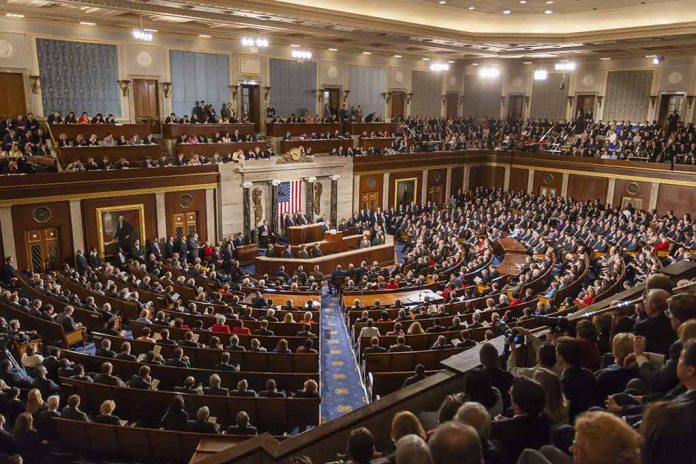
President Trump’s ambitious “Liberation Day” tariff program survived a Senate challenge with a narrow 49-49 tie vote, revealing deep divisions within the Republican Party over trade policy and executive power.
Key Takeaways
- The Senate vote on Senator Ron Wyden’s resolution to terminate President Trump’s tariff emergency declaration ended in a 49-49 tie, allowing the tariffs to remain in place
- Three Republican senators—Rand Paul, Susan Collins, and Lisa Murkowski—broke ranks to vote with Democrats against the tariffs
- Vice President JD Vance’s decisive vote tabled the measure, effectively ending the challenge to Trump’s tariff initiative
- Key absences included Senators Mitch McConnell and Sheldon Whitehouse, who might have influenced the outcome
- The House leadership has already blocked similar measures, indicating the tariffs will likely remain intact
Republican Fractures Emerge Over Trump’s Trade Initiative
President Trump’s emergency declaration to implement a sweeping 10% tariff on most U.S. trading partners remains intact after a Senate challenge fell short this week. The 49-49 tie vote revealed significant divisions within Republican ranks over trade policy, with three GOP senators breaking with their party to support the resolution that would have nullified the President’s “Liberation Day” tariff program. The measure, introduced as a privileged resolution by Democratic Senator Ron Wyden, required a simple majority to pass but ultimately failed when Vice President JD Vance cast the deciding vote to table it.
Republican Senators Rand Paul, Susan Collins, and Lisa Murkowski joined all 46 Democrats in voting for the resolution, demonstrating the complex dynamics within the GOP on trade policy. Two potential supporters of the resolution, Republican Senate Minority Leader Mitch McConnell and Democratic Senator Sheldon Whitehouse, were notably absent from the vote, further complicating an already tense political situation. Had they been present, the resolution might have cleared the Senate, though it would have faced an almost certain presidential veto.
US Senate narrowly rejects bipartisan measure to block Trump tariffs.
— FinancialJuice (@financialjuice) April 30, 2025
Conservative Principles at Stake
Senator Rand Paul of Kentucky, long known for his libertarian-leaning views, offered a pointed critique of the tariff policy rooted in traditional conservative values. His opposition highlighted a rift between Trump’s nationalist economic approach and traditional Republican free-market principles. Paul emphasized historical conservative tenets during the debate, suggesting that many of his colleagues privately harbor similar concerns but are reluctant to publicly oppose the President on his signature economic initiative.
“You know, there was an old-fashioned conservative principle that believed that less taxes were better than more taxes,” said Senator Paul, referencing historical principles against taxation without representation.
Maine Senator Susan Collins also expressed reservations about the broad scope of the tariffs while acknowledging their intent. “It’s not perfect, I think it’s too broad,” Collins remarked, raising questions about the undiscriminating nature of the trade measures. Senator Tim Kaine specifically questioned the inclusion of Canada in the emergency declaration, challenging whether our northern neighbor represents a genuine emergency requiring tariff action.
Political Calculations and Future Prospects
The closely divided vote reflects the complex political calculations facing Republicans as they navigate support for the President’s agenda while addressing concerns about traditional conservative principles and economic impacts. House Republican leadership has preemptively blocked similar measures from reaching the floor, shielding members from taking politically difficult votes on the tariff issue. This strategic move effectively ensures that even if the Senate had passed the resolution, the effort would have stalled in the House.
“It’s still a debate worth having,” Senator Paul noted, despite the obvious political challenges.
The Administration has defended the tariffs as essential to strengthening American manufacturing and securing better trade terms with global partners. Critics argue the measures may increase costs for American consumers and businesses while potentially triggering retaliatory actions from affected nations. As the tariffs remain in place following this Senate challenge, the economic impacts will continue to unfold across various sectors, with downstream effects on consumer prices and international relations still developing.
Sources:
- Senate Rejects Bipartisan Measure to Undo Trump’s Tariffs – The New York Times
- Vance breaks key tie after Senate fails to reject Trump’s national emergency on tariffs



